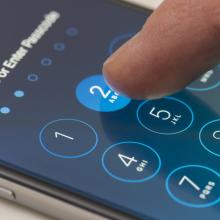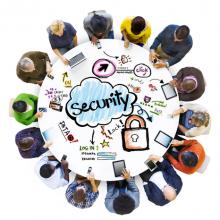Privacy

Image via ymgerman/Shutterstock.com
There are two things that make this order very dangerous, Opsahl said. The first is the question it raises about who can make this type of demand. If the U.S. government can force Apple to do this, why can't the Chinese or Russian governments? The second is that while the government is requesting a program to allow it to break into this one, specific iPhone, once the program is created it will essentially be a master key.
A friend recently found out that his girlfriend had been cheating on him. They broke up, she pleaded with him to take her back, they picked up where they left off, the trust issues proved too much to bear, and just a few days later he started dating another woman.
Interestingly, all of this information was divulged via social media. I, along with everyone else who knew the couple, was given front row seats to this Jerry Springer-ish episode that terminated their relationship.
As a society, we have definitely blurred some lines between what becomes public and what remains private.
Thanks to the abundance of information at our fingertips, we need only turn on the television or stand in the checkout lane or search Google to uncover the most up-to-date gossip on any public figure. And thanks to social media, we now get to know far more about our friends and acquaintances than we probably care to.
It seems that nothing is private anymore. But in what some may see as a terrible downturn in society, I find a glimmer of hope — this is, in part, paving the way for deep and relevant discussions on faith to take place in the public forum.
Yet when it comes to matters of faith, it seems a majority of us remain silent. Why is it that we will readily invite the entire world on our date via instagram, yet we are so hesitant to open up about our beliefs?
Yesterday morning at 5:30 I woke up to a disconcerting email:
Suspicious Sign-In Prevented. Please check your Google activity immediately.
In my half-asleep bleariness, I clicked the link and filled in my password.
Then I realized I'd been scammed.
"Recognize" was spelt "recognise" — and the account email was from Googlemail.com, not Google.com. Otherwise, the email was identical to those I'd gotten from Google in the past.
The next two hours were spent frantically re-securing my life. Changing passwords, adding two-step verification, application passwords.
I suddenly realized how much of my life was online. My Facebook page was a chronicle of my wedding, my jobs, my son's first 2 years of life.
Most people my age are the same way. Sometimes it's easier online.
The first people to find out about my pregnancy three years ago, besides my husband, were members of an online birth month group at WhattoExpect.com. Weeks before we told family or close friends, we shared intimate details about morning sickness, headaches, and faint lines on pregnancy tests.
Why do we do this? Somewhere, all of us, in Fantasy Football groups and pregnancy groups and dog lover groups and gluten-free groups: we're longing for Real Community.
SUMMER IS THE season for high school football practice. Two years ago, the players at Central Catholic High School in Portland, Ore., got a different kind of coaching, brought in by head coach Steve Pyne. For the first time, U.S. Army recruiters would serve as volunteers to run the football team through their strength and conditioning paces—helping them prepare for the annual “Holy War” matchup against archrival Jesuit High School.
According to an article in the U.S. Army’s monthly Recruiter Journal, the Army “footprint” for the big game included a Humvee parked outside the stadium and a pre-kickoff event in which local recruiters placed “unit patch decals from various Army divisions” onto players’ helmets.
“Not once at practice did we talk about the Army,” said one of the recruiters. “It wasn’t about the Army. It was about how we can integrate ourselves into the community in a way the community will accept us and not feel like we are a threat.”
In recent years, the Pentagon’s military recruiting capabilities have experienced a quantum leap—including unprecedented access to Christian high schools. Not only are military recruiters using football to gain entry into parochial schools, but they are increasingly relying on military testing in schools to access students’ private information without parental consent.
What does the ancient arrangement of tents in an ancient Israelite encampment have to do with the ultramodern question of whether the U.S. government should be peering into the ultramodern phone and Internet records of hundreds of millions of Americans?
Or to put it another way, are there any spiritual and religious roots to the notion of personal and household privacy?
To start from the Bible: Many Jewish prayer services begin with a quotation from a non-Jewish shaman, himself quoted in the Torah (Num 24:5 — this passage of Torah will be read two weeks from now, on June 22.) There was a king, Balak by name, who hired an expert shamanic curse-hurler, Balaam, to curse the People of Israel who were swarming across the wilderness after their liberation from slavery under Pharaoh.
On Slate, Emily Bazelon laments her colleagues’ lack of outrage at the revelations of the National Security Agency’s vacuuming up of data on what all of us are doing. In the New York Times, Ross Douthat explains it in terms of an internet motto: “abandon all privacy, ye who enter here.”
Privacy is soooo 20th century, no?
Yes. We now live in a world where we are constantly making choices that trade our privacy for convenience, from Easy Pass to global positioning to, of course, all the on-line services and commerce that we indulge in. No wonder the collective yawn at news that the federal government is doing what we assume Google is doing, in the (presumed) interest of public safety.
Politically, the right to online privacy seems like a no-brainer. Just as employers, and the government, shouldn’t be allowed to snoop through one’s personal diary or journal, the privacy of our digital records should be likewise respected, in law and in practice.
But biblically, theologically, and spiritually, it gets more complicated. For instance, what would a “spirituality of privacy” look like? At the core of spirituality is a connection with the divine. That begins in our heart of hearts and is by necessity a private, solitary practice. But it doesn’t end there. Genuine, life-transforming spirituality is personal, but never “private,” in the sense of “restricted to me alone.” Rather, spirituality is about the connection between a person and the divine and about the connection between a person and other people. In other words, there is an essential communal, public aspect of spirituality. Genuine spiritual enlightenment leads not only to an enriching of our connection with God, but with one another as well. Thus in some ways the distinction between a “private” spirituality and our public face is an artificial one, and at our best these two aspects of our being will be in harmonious synchronicity.
Piano-playing cats or union organizing drives—Google and Facebook don’t care. They just keep a sieve in the flow to collect information that can be sold to advertisers.




